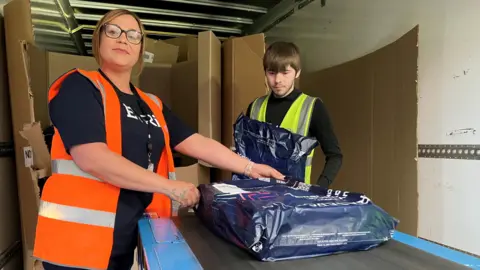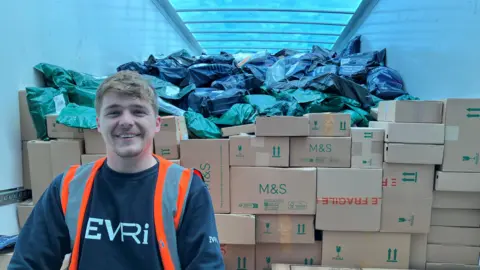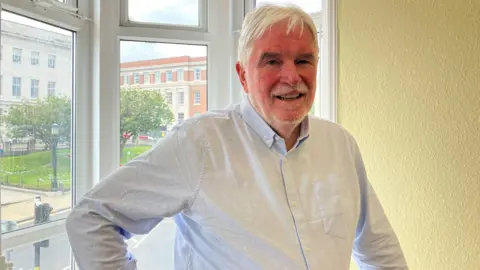How warehouse jobs have transformed the coalfields
 BBC
BBCParcels zoom past on high-speed conveyor belts in a South Yorkshire warehouse, ready to be dispatched across the country. Four decades ago coal was king in these former pit towns, now it’s fast fashion being exported.
As many people are now employed in warehousing as worked in the collieries during the industry's peak.
A boom in online shopping has created jobs and opportunities with couriers such as Evri or retailers like Pretty Little Thing, who all have distribution centres near Barnsley and the M1.
Despite some fears that the sector could be "vulnerable" to automation and AI, experts believe it has brought permanent changes to the demographic make-up and employment in the coalfield region.
Former mining areas in South, North and West Yorkshire now have 60,000 people working in more than 1,000 warehouses. Overall, the warehouse and logistics sector has about 180,000 employees across England, Scotland and Wales, which is as many as worked in the coal industry leading up to the 1984-5 miners' strike.
Yorkshire has been hailed the "capital of warehousing" as the "staggering" growth accounts for nearly half of new employment in the coalfields region today.
Though wages and working conditions in warehouses have been subject to criticism and scrutiny, some of the Barnsley workforce said their roles were ideal because they offered flexibility, progression and convenience.
Lauren Smith said she had been stuck in "dead end" jobs before applying to Evri. She began as a warehouse operative before transferring to administration and supervisory positions, and she has also served as a trade union rep.
She said: "I’ve never been to a place which has given me as much as this place has. It’s a job that had the most potential for me."
Early shifts and a job close to home gave the 32-year-old an excuse to try her hand at something new, and she said her partner and friends also work in distribution centres because of the flexible hours.
Maxwell Henderson worked in construction but when jobs dried up, he decided to try an Evri role because the hours meant he could pick his daughter up from school and spend more time with her.
"I tried it and it turns out I enjoy it," he said.
He began as an agency worker and is now a full-time supervisor.

The Evri site is part of a cluster near the M1 that also includes ASOS, Pretty Little Thing and M&S. It is the company's lead "hub" and has been since 2022.
Gareth Shawcroft, head of the Barnsley centre, said: "Ever since Covid, there has been a boom in online shopping - that’s really not gone away. While it has dropped, it is still at a higher level. We’ve seen a lot of growth and that’s really helping to support our growth."
The warehouse was built with internal cranes so that extra floors can be created during expansion periods.
The perfect match
Yorkshire’s central location in the UK and close motorway links have provided the ideal locations, and many of the former colliery sites have been taken up by these developments.
Most recently Kellingley Colliery, England’s last deep coal mine, was converted into a warehouse and logistics business park.
Evri opened its network hub in Barnsley to provide delivery services for the clients that had already opened their own bases nearby.
However, the State of the Coalfields 2024 commissioned by the Coalfields Regeneration Trust sounded a warning about the "deterioration" of quality jobs in the region.
The report stated that warehouse work could be "labour intensive, poorly paid and with little union representation", although Evri pays salaries that are above the Living Wage.
Mark Todd from the trade union USDAW said: “It is very worrying when you hear stories of people not being able to leave their workstations to go to the toilet.
"When we work with employers we expect that their colleagues are safe and respected."
'Pit closures 2.0'
The Evri centre has more than seven miles of conveyor belts, but the parcels on them are sorted by machines.
Mr Shawcroft said that humans "do a better job" in some areas compared to technology and automation.
"The majority of people are either in the back of trailers putting the parcels on to the sortation equipment, or in the back of trailers outbound," he said.
"We’ve looked at automating that but actually they can’t do as good a job as human beings currently - so while that is still the case, we’ll always use people to do those jobs."
Dr Nicky Stubbs from the University of Sheffield said the industry had "potential vulnerabilities" which could expose workers in the future.
He said: "I’m not going to suggest that we’re going to end up in a pit closure 2.0 scenario. But one thing local authorities need to get their head round is how vulnerable some of these jobs are in warehousing, so they can respond.”

Prof Steve Fothergill from Sheffield Hallam University is an expert in coalfields regeneration and said he had "never predicted" the growth of the logistics sector.
"Five years ago, when we first started to identify this significant growth in warehousing in employment in Yorkshire, several people said these jobs will disappear to automation," he said.
"They thought it was a flash in the pan, but what actually happened was that employment has accelerated.
"I’m not saying it’s going to continue forever and there will be automation which will remove some of the jobs but for the moment, there is a lot of momentum."
He added that he expected to see the continued rise "for some while yet".
The professor also researched the origins of staff in the industry, and identified that more than half of the jobs filled between 2011 and 2021 went to UK residents born overseas.
He added: "Only half the benefit has filtered through to local residents and that’s quite a startling observation.
"I can’t help but feel that the growth in warehousing is an important trigger to this major change of composition of the population."
Listen to highlights from South Yorkshire on BBC Sounds, catch up with the latest episode of Look North or tell us a story you think we should be covering here.
